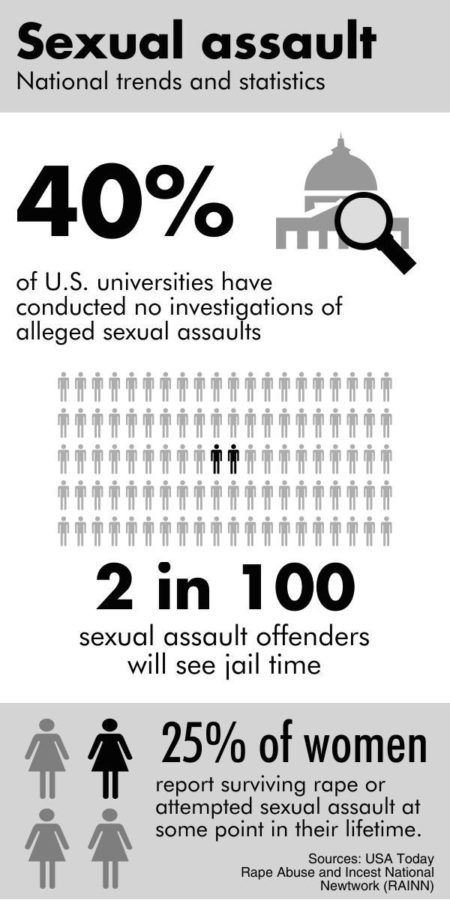Glawe: Rape culture must end
January 27, 2015
In Vladimir Nabokov’s masterpiece, “Lolita”, we are given the villainous tale of Humbert Humbert, a proper yet detestable man who becomes sexually infatuated with the 12-year-old Dolores Haze, a “nymphet” in Humbert’s words. The book is a narration by Humbert, who wishes to explain himself to a world he deems unfit to understand his predicament.
Throughout the novel, Humbert desperately attempts and succeeds in sexually abusing Dolores, who he secretly names “Lolita.” As Humbert explains, he and Lolita were in love with each other and it was she who forced herself upon him. I remember reading Humbert’s shameless excuses and how I was nearly tricked into sympathizing with him. With horror, I realized Nabokov’s mastery — as a reader, you actually side with Humbert.
The subtle mind game of the book provides an interesting parallel that demands our attention. Although “Lolita” is a story of pedophilia, it falls into the shadow of rape and Humbert’s excuses, and our reactions to them are not unlike those of the perpetrators of that crime. The parallel becomes eerily familiar when Humbert drugs “Little Lo” with the intention of abusing her.
Whether we like it or not, many universities, including Iowa State, have the capacity to play host to multiple Humbert Humberts. In many cases, rapists satisfy their sick pleasures without consequence and the victims live on, absent of retribution or consolation and full of pain, sorrow and anger.
Nonexistent repercussions are what you get in a culture that shrugs at the victims and callously dismisses their claims.
How deplorable it is that grown men can write a hit song with the line, “You know you want it,” and repeat it 18 times. I remember listening to “Blurred Lines” at parties, and, with yet another horrifying realization, I enjoyed its catchiness.
It is the nonchalance of the song — among others — that appalls me. The tune represents a deplorable, detestable, disgusting, depressing, despicable culture of rape that is largely ignored by universities for the sake of keeping rape numbers low. Fill those dorms and colleges — the breeding grounds for these monsters — without concern for the violence at night.
More than 40 percent of U.S. colleges and universities have not conducted investigations of alleged sexual assaults. According to the Rape Abuse and Incest National Network, only about 2 in 100 rapists will ever serve a day in jail. Why? The culture of rape is thriving, that’s why.
Common behaviors associated with rape culture include the trivialization of rape, the denial of widespread rape — ahem, universities — and blaming the victim.
We are all at once equal manifestations of Mr. Humbert when we ask a rape victim, “What were you wearing that night?” or “Were you drinking?” What about the rapist? The villain? Does his social prerogatives supersede the victim’s safety? Our dialogue, for some reason, requires two-sidedness. But this issue cuts deeper into the very fabric of a society laced with misogyny and inequality.
I am, admittedly, ashamed of my gender. We think with our crotch first and our brain later. After five years of undergraduate hell, I am convinced that every man attends college for two reasons: job security and the fulfillment of physical pleasures. Perhaps this explains why rape culture is so enduring on our campuses — it is an opportunity to satisfy sexual drives. Maybe this proclamation is too Freudian, but it seems common nowadays — an observation reinforced with ample evidence.
While there are men who have built up a resistance to the instinct of our lowly origins, the majority has surrendered the decision-making to a shallower force. Guys, none of this has anything to do with what the woman was wearing or if she forced herself upon you. Accountability begins and ends with us.
Azar Nafisi, author of “Reading Lolita in Tehran”, provided an interesting contrast to Humbert’s victim when she observed, “Because her name is not Lolita, her real name is Dolores, which means “dolour” in Latin, so her real name is associated with sorrow and with anguish and with innocence, while Lolita becomes a sort of light-headed, seductive, and airy name. The Lolita of our novel is both of these at the same time and in our culture here today, we only associate it with one aspect of that little girl and the crassest interpretation of her.”
As men, too often we perceive women as the seductive “Lolita,” instead of preserving the innocent Dolores. Humbert realizes at the end of the novel that he stole Dolores’ identity and made it his own — he robbed her of her childhood. We do the same when we objectify women and see them how we want to see them, except we never come to the realization that we are defining who they are for them. In that guiltless light, we may stoop lower than even Humbert himself.
The sexual obsession is a squandering pursuit. It sucks the vitality out of life, diminishes the quality of genuine intercourse with a lover and ultimately leaves us in shame and want of something greater than ourselves. As men, we can emancipate ourselves from the slavery of addiction and find solace in greater pleasures.
I can think of no better ending punctuation to this conclusion than that of Shakespeare’s Sonnet 129, which, as Harold Bloom from “A Streetcar Named Desire” puts it, is “a litany of desire that prophesies only further desire, further erotic disaster.”
Shakespeare’s Sonnet 129:
Th’ expense of spirit in a waste of shame
Is lust in action, and till action, lust
Is perjured, murd’rous, bloody, full of blame,
Savage, extreme, rude, cruel, not to trust,
Enjoyed no sooner but despisèd straight,
Past reason hunted, and no sooner had,
Past reason hated as a swallowed bait
On purpose laid to make the taker mad;
Mad in pursuit, and in possession so,
Had, having, and in quest to have, extreme;
A bliss in proof, and proved, a very woe;
Before, a joy proposed; behind, a dream.
All this the world well knows, yet none knows well
To shun the heaven that leads men to this hell.







